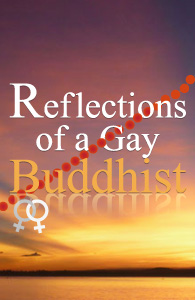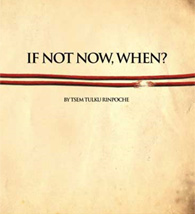Just the other day I got bollocked at work for something that wasn’t my fault. Before I met the Dharma, I would have fought tooth and nail for "justice" and "fairness." However, now with the Dharma, it’s rather different.

What happened was – I was working on editing a book by my colleague and friend, the very lovely David. The process agreed upon was that chapters were first edited by my Editor-in-Chief (EIC), then passed to me to edit, then it went back to dear David, who would collate the changes, print out and put them back on the EIC’s desk.
Simple really.
However, when the EIC came into the office, expecting to see a nice stack of printed papers on her desk, they weren’t there. Of course my dearest David was not in the office at the time, but I was, so I was told off by my CEO for not putting the chapters on EIC’s desk - when it wasn’t even my job to do so. I pursed my lips and glowered inside, while I tried (and failed dismally) to maintain a façade of beatific Buddhahood.
I bit back on explanations of my "innocence," on elaborate justifications and on sarcasm, which would get me nowhere. So I just told myself to shut up. And chanted some mantras in my head. Chanting mantras really work to calm down anger – really. A simple yet powerful mantra like Om Mani Padme Hum, the mantra of the Buddha of Compassion, does wonders for an errant mind! Mantras are the energy of the respective Buddha in the form of sound, and when chanted, invokes on that energy to bless us and our surroundings. I find I simply can’t be angry when chanting Om Mani Padme Hum!
While I chanted, my mind started to calm down so I was able to think. What could I have done to have avoided the situation or made the situation better? Yes, it wasn’t my job to print out the chapters, but I could have checked if darling David had done so or not, and nag him to death to do so. That would be taking responsibility. By looking beyond our own responsibilities and simply through caring for each other, we can achieve a whole lot more.
Also, I knew that my CEO wasn’t being a bitch (I like her a lot actually) but she was merely trying to get the job done. It wasn’t personal (and so what if it was, anyway).
Of course it’s not easy. It’s not our second nature to be all forgiveness and light. However, we can catch ourselves when we react emotionally to what we perceive as unfair accusations. When we react, it is usually our ego, inflating as quickly as an airbag in an accident and obscuring our vision.
Anger is one of the three deadly poisons, the others being ignorance and attachment. Anger is so deadly because it clouds our judgment and makes us say or do things to hurt someone else, whether they deserve it or not. And some people, I’m sure you know, are skilled at cutting with words. We may regret at the next moment, but the harm is already done and often difficult to repair.
Anger arises when things do not go the way we want. When we are threatened. When we are affronted. When we perceive that we have been wronged.

If Not Now, When? by Kechara Publications features imagery and quotations from H.E. Tsem Tulku Rinpoche's teachings.
One of the Eight Verses of Thought Transformation, which is central to mind training in Tibetan Buddhism, states:
During all actions, as soon as thoughts
Or delusions arise in my mind
That are harmful to myself and others,
May I stop them with effective means!
Buddhism teaches us to realise things as they are. When anger arises, which may harm ourselves and others, we should catch the negative emotions immediately and watch it pass.
As H.E. Tsem Tulku Rinpoche says, “Do not hold anger, it benefits no one. Do not act out of anger, you will only be ashamed afterwards. Do not incite anger because you will get burned. Be the first to make peace. Be the peacemaker and wherever you go, you will be loved and be able to love.”
After being aware of the illusion of anger, and its solution; of focusing outwards and on practical solutions rather than simply meditating on my fragile ego, I found that my negative emotions often quickly evaporate and disappear into the nothingness from which it arose. As I practice more and more on clearing my negativities, it does get easier every time. That’s why they call it spiritual practice!
